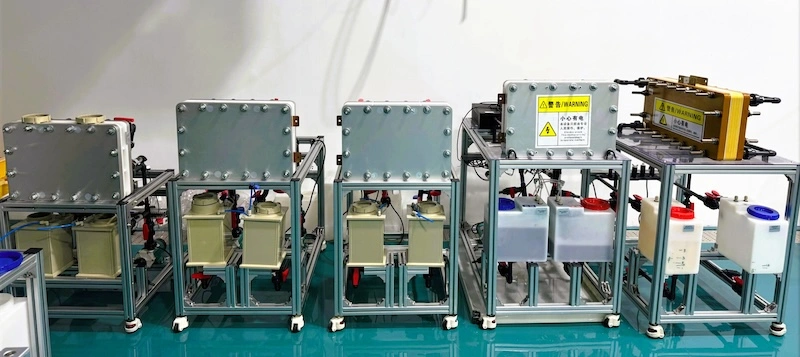
Become a member & keep reading for free, or choose a paid membership.
Access all our content & email newsletter
Flux XII, an energy storage startup based in Madison, Wisconsin, has closed a $3.95 million seed round to accelerate development of materials and prototypes for aqueous flow batteries aimed at long-duration grid storage. According to the company’s announcement, financing was led by the Grantham Foundation for the Protection of the Environment, with participation from the Wisconsin Alumni Research Foundation (WARF), Desai Ventures, and gener8tor.
The funding will be used to scale production of electrolytes and membranes in industrial facilities, advance multiple kilowatt-scale prototype devices now in testing, and complete validation of a minimum viable product module in 2026. The company says it also plans to design a fully integrated, containerized battery energy storage system (BESS) and to assemble a consortium of utilities, developers, universities, and research partners to run system pilots in 2027.
Flux XII develops tunable organic chemistries for aqueous flow batteries, which store energy in liquid electrolytes held in external tanks. Flow batteries have long been proposed as an alternative to lithium-ion for long-duration storage because their power and energy capacity scale independently, and they can use less flammable chemistries. Flux XII says its materials are derived from abundant feedstocks, and that the company is focused on lowering capital costs and footprint to make flow systems more competitive at utility scale.
“Grid power developers need more capacity, and it needs to be cheaper, safer, and cleaner than gas or lithium-ion batteries,” CEO and co-founder Patrick Sullivan said in a statement. Flux XII has previously received support from several accelerators and investors, including Activate Fellowship, Third Derivative, Gigascale Capital, and The Collaborative Fund.
Investor backing highlights commercial interest in alternatives to lithium-ion as grid operators seek ways to store renewable energy for multi-hour to multi-day durations. The Grantham Foundation’s statement called the chemistry “safe and rapidly scalable” and suggested the technology could help renewables compete with thermal generation overnight or during wind lulls.
Aqueous flow batteries offer advantages such as modular energy scaling, potential for long-duration discharge, and reduced fire risk, but face challenges including lower energy density than lithium-ion batteries, system complexity, and the cost of membranes and supporting balance-of-plant equipment. Commercial deployments to date have been limited, and developers must prove lifetime durability, low degradation rates, and an attractive levelized cost of storage at megawatt-plus scales.
Flux XII aims to cut capital expenditures for flow systems by as much as 50% at 100-megawatt scales. This target should make the technology more competitive in markets that require four-hour to multi-day storage for grid reliability, the integration of renewables, and new electrified loads such as data centers and manufacturing facilities.
Over the next two years, Flux XII plans to validate its MVP under controlled conditions in 2026 and pursue field pilots in 2027 with utility and developer partners, and achieving long-lived, low-cost operation at scale may be the key to attracting business.
Trending Stories




